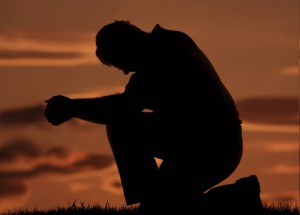We come this week to a difficult chapter of Scripture that exhibits God’s judgment on sin. We can’t simply skip over these events because they make us uncomfortable. Although they illustrate judgment, they also show God’s mercy toward His covenant people.
The Angels Arrive in Sodom
“The two angels came to Sodom in the evening, and Lot was sitting in the gate of Sodom. When Lot saw them, he rose to meet them and bowed himself with his face to the earth and said, ‘My lords, please turn aside to your servant’s house and spend the night and wash your feet. Then you may rise up early and go on your way.’ They said, ‘No; we will spend the night in the town square.’ But he pressed them strongly; so they turned aside to him and entered his house. And he made them a feast and baked unleavened bread, and they ate” (vv. 1-3 ESV).
The two men who appeared with the Lord before Abraham in chapter 18 are here revealed to be angels. When they arrive, Lot is sitting at the gate of the city. This may indicate that he was an official or elder in the city. He had lived there perhaps twenty years. He extended hospitality to these visitors, which was important in their culture. To take someone into your house was to provide for their needs as well as their safety, which would quickly become important in Sodom.
Sin Runs Rampant
“But before they lay down, the men of the city, the men of Sodom, both young and old, all the people to the last man, surrounded the house. And they called to Lot, ‘Where are the men who came to you tonight? Bring them out to us, that we may know them.’ Lot went out to the men at the entrance, shut the door after him, and said, ‘I beg you, my brothers, do not act so wickedly. Behold, I have two daughters who have not known any man. Let me bring them out to you, and do to them as you please. Only do nothing to these men, for they have come under the shelter of my roof.’ But they said, ‘Stand back!’ And they said, ‘This fellow came to sojourn, and he has become the judge! Now we will deal worse with you than with them.’ Then they pressed hard against the man Lot, and drew near to break the door down. But the men reached out their hands and brought Lot into the house with them and shut the door. And they struck with blindness the men who were at the entrance of the house, both small and great, so that they wore themselves out groping for the door” (vv. 4-11).
Some people may try to argue that the word know in verse 5, “that we may know them,” should be taken at face value as getting acquainted. However, the context makes it clear that it refers to sexual relations, just as it did in Genesis 4:1, “Now Adam knew Eve his wife, and she conceived.” Lot clearly understood the motives of the men of the city to be wicked. Note that this was all the men of the city, not just a handful of rowdies. Genesis 13:13 reported, “Now the men of Sodom were wicked, great sinners against the Lord,” and obviously the city had not changed greatly since then.
Lot tried to intervene. He first places himself between the citizens and the visitors, and then offers a compromise. Although it seems shocking to us, he offers his virgin daughters to these wicked men. The Bible doesn’t explain his motivation, but is does show the dangers of trying to compromise with a sinful culture. The angels pulled Lot to safety and supernaturally struck the men blind. Even blind the men tried to pursue their sinful intentions.
Orders to Leave
“Then the men said to Lot, ‘Have you anyone else here? Sons-in-law, sons, daughters, or anyone you have in the city, bring them out of the place. For we are about to destroy this place, because the outcry against its people has become great before the Lord, and the Lord has sent us to destroy it.’ So Lot went out and said to his sons-in-law, who were to marry his daughters, ‘Up! Get out of this place, for the Lord is about to destroy the city.’ But he seemed to his sons-in-law to be jesting” (vv. 12-14).
The angels give Lot orders to get his family and leave the city immediately. Lot tries to tell his sons-in-law, but they don’t believe him. It isn’t clear whether these were men engaged to Lot’s virgin daughters or if Lot had other daughters who were already married. In either case, those who remained in the city were about to be destroyed. It seems that perhaps Lot was dragging his feet as well, because the angels had to repeat their warning to leave.
“As morning dawned, the angels urged Lot, saying, ‘Up! Take your wife and your two daughters who are here, lest you be swept away in the punishment of the city.’ But he lingered. So the men seized him and his wife and his two daughters by the hand, the Lord being merciful to him, and they brought him out and set him outside the city. And as they brought them out, one said, ‘Escape for your life. Do not look back or stop anywhere in the valley. Escape to the hills, lest you be swept away’” (vv. 15-17).
In their escape, they are given orders not to stop or look back. The situation is more urgent than Lot seems to understand.
“And Lot said to them, ‘Oh, no, my lords. Behold, your servant has found favor in your sight, and you have shown me great kindness in saving my life. But I cannot escape to the hills, lest the disaster overtake me and I die. Behold, this city is near enough to flee to, and it is a little one. Let me escape there—is it not a little one?—and my life will be saved!’ He said to him, ‘Behold, I grant you this favor also, that I will not overthrow the city of which you have spoken. Escape there quickly, for I can do nothing till you arrive there.’ Therefore the name of the city was called Zoar” (vv. 18-21).
They finally get on their way after Lot bargains for a shorter trip to a small town nearby. The angels reassure him that they won’t do anything until he is out of harm’s way,
The End of Sodom and Gomorrah
“The sun had risen on the earth when Lot came to Zoar. Then the Lord rained on Sodom and Gomorrah sulfur and fire from the Lord out of heaven. And He overthrew those cities, and all the valley, and all the inhabitants of the cities, and what grew on the ground. But Lot’s wife, behind him, looked back, and she became a pillar of salt” (vv. 23-26).
The two cities were destroyed completely. This was not just a natural disaster that was attributed to God. This was supernatural judgment on the sins of the people. Fire and sulfur came down as if they were living on a volcano.
Though four people left Sodom, only three survived. Lot’s wife looked back, not just glancing over her shoulder, but gazing with regret and regard for the city. She ignored the angel’s command and suffered the consequences.
Mercy Under the Covenant
“And Abraham went early in the morning to the place where he had stood before the Lord. And he looked down toward Sodom and Gomorrah and toward all the land of the valley, and he looked and, behold, the smoke of the land went up like the smoke of a furnace. So it was that, when God destroyed the cities of the valley, God remembered Abraham and sent Lot out of the midst of the overthrow when He overthrew the cities in which Lot had lived” (vv. 27-29).
Abraham could see the smoke from where he lived, and understood that God’s judgment had fallen just as the Lord had told him in Genesis 18:20-33. The passage concludes with a comment that “God remembered Abraham.” God hadn’t forgotten anything. This phrasing is used to bring to mind that covenant that God had made with Abraham to make him the father of many nations.
In 2 Peter 2:7-8, Lot is referred to as being a righteous man, but he wasn’t the one that God had made the covenant with. In this case, Lot benefits from the covenant by being associated with the righteous Abraham.
Romans 3:10-12 states:
“None is righteous, no not one; no one understands; no one seeks for God. All have turned aside; together they have become worthless; no one does good, not even one.”
On our own, none of us are good enough to deserve salvation. We can’t compare ourselves to one another, because God judges us by His perfect standard. Only Jesus Christ lived up to that standard, and only in Christ are we made righteous and acceptable to God. We are included in God’s eternal covenant because we are associated with the One who is perfectly righteous.
Although we may be tempted to condemn Lot for his choices, and Sodom and Gomorrah are prime examples of wickedness, we too are deserving of condemnation apart from the mercy of God in giving us salvation through Jesus Christ. This should cause us to be humble and grateful recipients and messengers of God’s love and forgiveness.
“Since all these things are thus to be dissolved, what sort of people ought you to be in lives of holiness and godliness, waiting for and hastening the coming of the day of God, because of which the heavens will be set on fire and dissolved, and the heavenly bodies will melt as they burn! But according to His promise we are waiting for new heavens and a new earth in which righteousness dwells” (2 Pet. 3:11-13).
Application
1) What more can we learn about Lot and Sodom in Luke 17:20-37 and 2 Peter 2:4-9? How can we apply these passages to our lives today?
2) Is the pursuit of holiness a priority in your life? How does that impact your daily decisions?
3) Do we as individuals and as a church preach both the reality of God’s coming judgment and the good news of God’s mercy through faith in Jesus Christ? How would you present the gospel to someone who knows nothing about the Bible?






